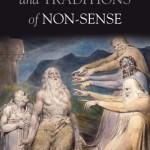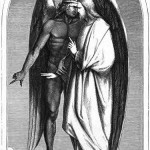We run our website the way we wished the whole internet worked: we provide high quality original content with no ads. We are funded solely by your direct support. Please consider supporting this project.

Does the Lord “Devastate” the Earth?
There is this passage that has sometimes been labeled “Isaiah’s Little Apocalypse” that proclaims how the Lord will “lay waste,” “destroy,” and “ruin” the earth. (The following builds on this previous post which identifies a dual speech pattern of God). It begins with:
The LORD is going to lay waste the earth
and devastate it;
he will ruin its face and scatter its inhabitants (24:1).
Isaiah goes on to decry that “the earth will be completely laid waste and totally plundered” (Isa 24:3) because it has been “defiled by its people” who “have disobeyed the laws” and “broken the everlasting covenant” (vs. 5). Isaiah declares that “a curse consumes the earth” and “its people must bear their guilt” (vs. 6). When free moral agents fall, all that is under their authority falls with them.
Thus far a reader would be justified in assuming that the Lord himself was going to bring about the massive destruction Isaiah speaks of. We get a very different impression, however, if we continue reading, for we soon discover how the Lord planned on bringing about this curse. Relying on the typical ANE conception of anti-creational forces as hostile waters, and using language that is reminiscent of the reversal-of-creation flood account in Genesis, Isaiah proleptically declares:
The floodgates of the heavens are opened,
the foundations of the earth shake.
The earth is broken up,
the earth is split asunder,
the earth is violently shaken (Isa 24:18-9).
These passages indicate that way Yahweh curses the earth is simply by removing the protection (the “floodgates”) that had previously kept hostile cosmic forces at bay. And it is important to notice that, while Yahweh allows these forces to carry out their malevolent designs as a consequence of people’s rebellion, there is no suggestion in this or any other passage that God wanted these forces to be the way they are or that God causes these forces to engage in this destructive activity. To the contrary, Isaiah immediately adds that, once this judgment is complete, Yahweh will “punish the powers in the heavens” and will once again “shut them up” in a “dungeon” and a “prison” (vs. 22).
Just as we have seen God does with violent kings and wicked nations, the sovereign God makes wise use of evil agents as he finds them. But we must never misinterpret God’s willingness to use wicked cosmic forces, wicked nations, and violent kings as indicating his approval of their violence. For as God does in this passage, and as we have seen him do throughout Scripture, once God is done allowing these agents to carry out their destruction, God turns around and punishes them for being the kind of agents he could use for this purpose.
In any event, though it is clear that Yahweh judges the earth in Isaiah 24 by merely withdrawing protection, Isaiah nevertheless depicts him as actively cursing the earth. This passage thus illustrates once again the dual speech pattern that we’ve been discussing. Reflecting his culturally conditioned mindset in which ascribing violence to God was considered the highest form of praise, Isaiah depicts Yahweh doing what in in truth merely allowed.
Photo credit: _Hadock_ via Visual Hunt / CC BY-NC-ND
Category: General
Tags: Cruciform Theology, Judgment
Topics: Interpreting Violent Pictures and Troubling Behaviors
Related Reading

God of Sense and Traditions of Non-Sense
As the title suggests, in his book, God’s Problem: How The Bible Fails to Answer Our Most Important Question – Why We Suffer, Bart Ehrman argues that the Bible has nothing compelling to say about the problem of evil. Well, I just put down a beautifully written four-hundred and fifty page book that compellingly argues…

Challenging the Habit of Judgment
Jesus said, “Do not judge, or you too will be judged. For in the same way you judge others, you will be judged, and with the measure you use, it will be measured to you” (Matt 7:2). In our world where we encounter a nearly constant stream of judgments on social media or the news,…

The Image of Cross-Like Love: God’s Self-Portrait, Part 6
In the previous blog I argued that God is cross-like love. In this blog I’d like to take this a step further by demonstrating why the cross alone could function as the definitive revelation of God’s true character and by showing how this revelation weaves together everything Jesus was about. If you want to know…

God Became What He is Not To Reveal What He Is
We are saved because Jesus became the curse of the law for us (Gal. 3:13). So too, the way Christ freed us from the condemnation of sin and enabled us to “become the righteousness of God” was by becoming sin for us (2 Cor. 5:21). What is more, since the curse of the law includes enslavement to…

What Does Spiritual Warfare Have To Do with the Cross?
Last week, we covered a few posts on the nature of the Atonement and the Christus Victor view. The following continues this theme, specifically looking the motif of spiritual warfare and how it relates to Christ’s work on the cross. This is an adaptation from Greg’s article in The Nature of the Atonement: Four Views. …

The Cruciform Center Part 4: How Revelation Reveals a Cruciform God
I’ve been arguing that, while everything Jesus did and taught revealed God, the character of the God he reveals is most perfectly expressed by his loving sacrifice on the cross. Our theology and our reading of Scripture should therefore not merely be “Christocentric”: it should be “crucicentric.” My claim, which I will attempt to demonstrate…
